外研版九年级英语上册课件 Module 3 Heroes Unit 2(共26张PPT)
文档属性
| 名称 | 外研版九年级英语上册课件 Module 3 Heroes Unit 2(共26张PPT) |
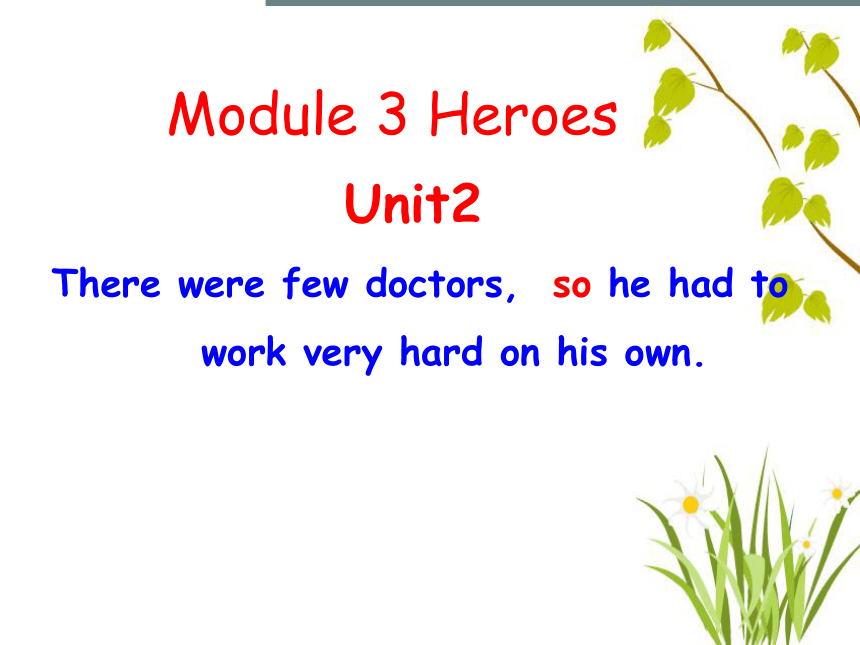
|
|
| 格式 | ppt | ||
| 文件大小 | 2.6MB | ||
| 资源类型 | 教案 | ||
| 版本资源 | 外研版 | ||
| 科目 | 英语 | ||
| 更新时间 | 2022-08-05 17:10:30 | ||
图片预览

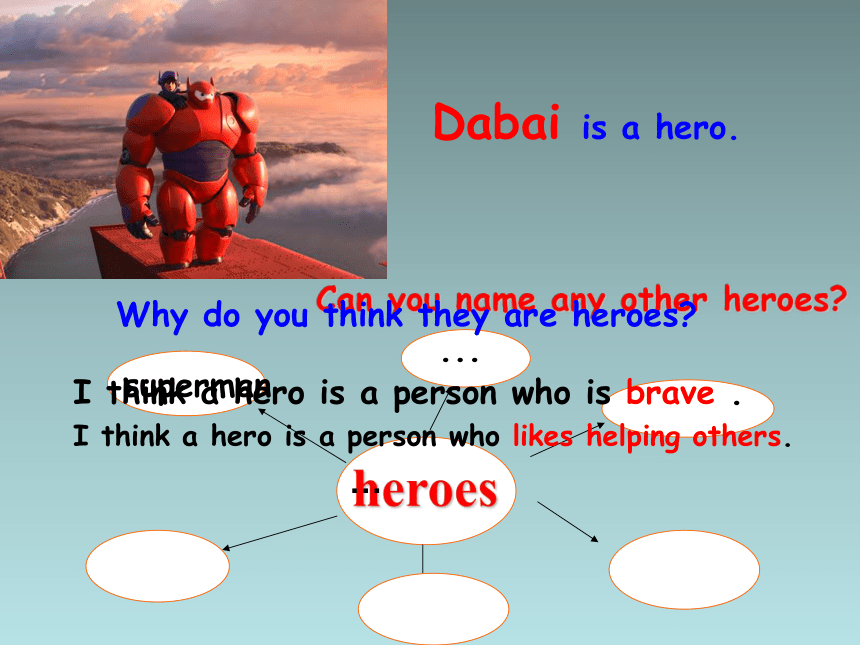


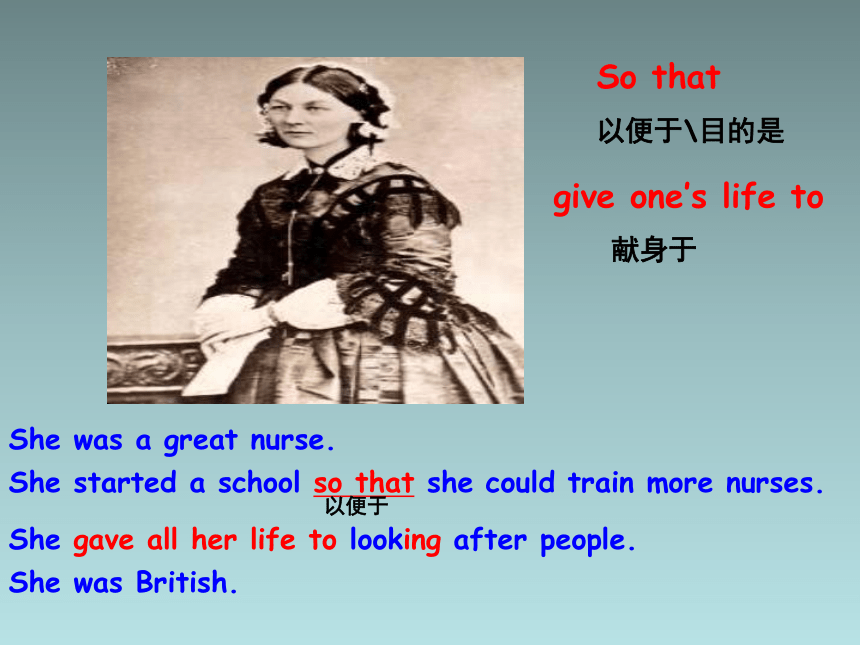
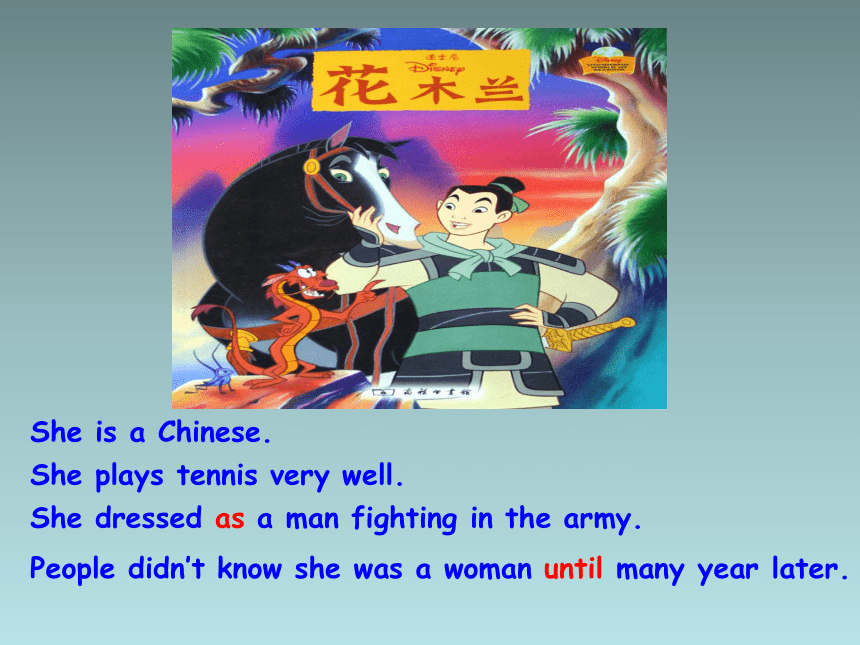
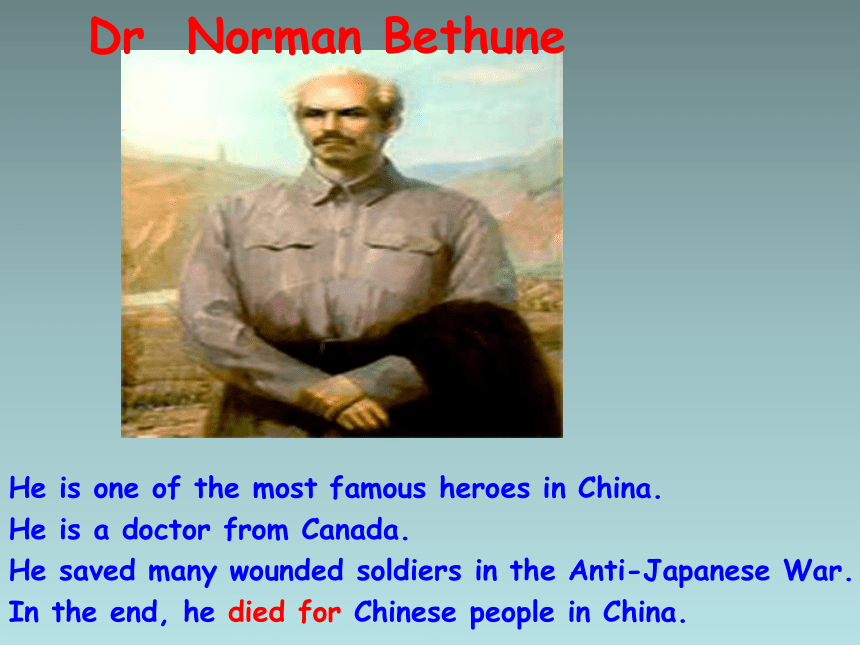
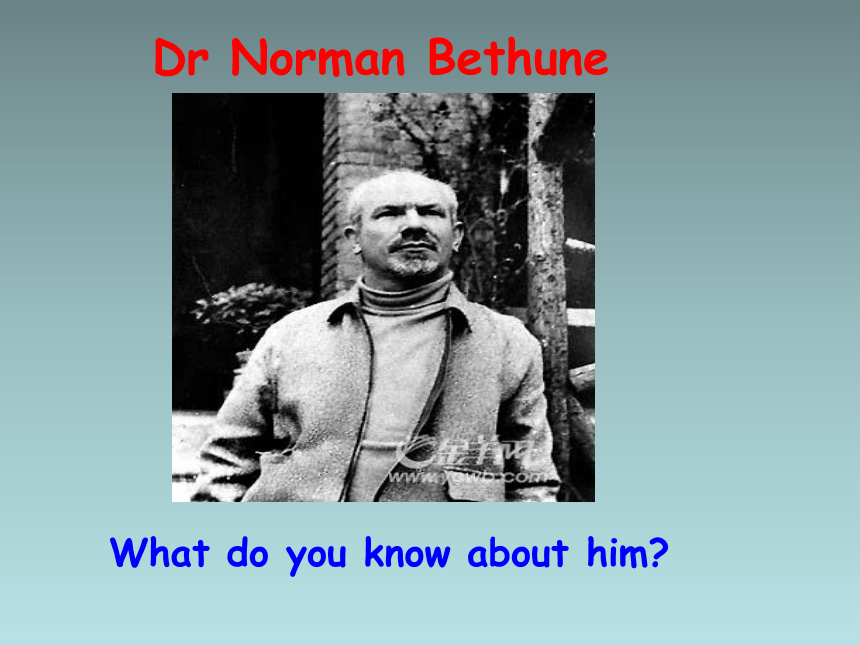
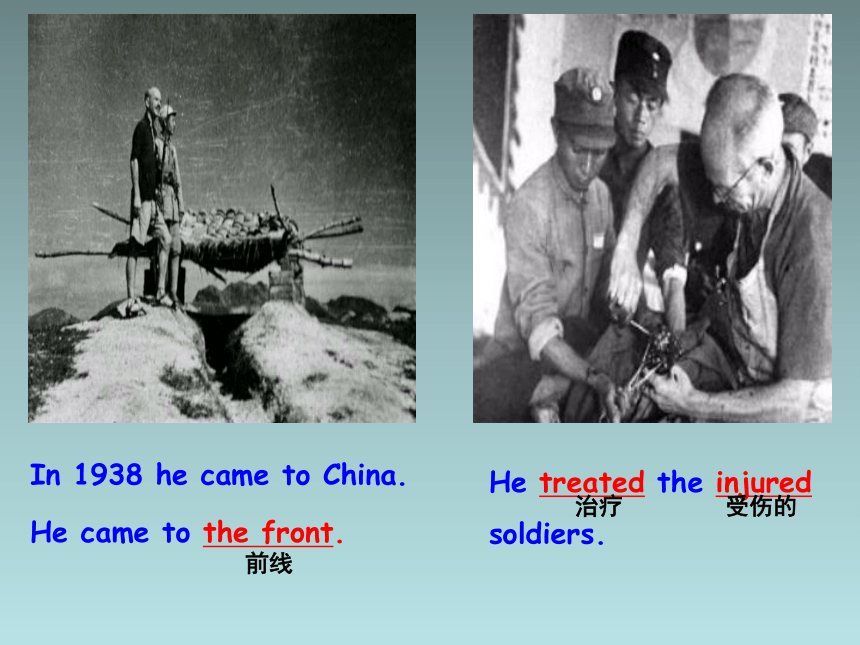
文档简介
(共26张PPT)
Unit2
There were few doctors, so he had to
work very hard on his own.
Module 3 Heroes
Dabai is a hero.
Can you name any other heroes
heroes
Why do you think they are heroes
superman
...
I think a hero is a person who is brave .
I think a hero is a person who likes helping others.
…
He is Chinese.
He has a daughter and a wife.
He is from Shanghai.
He is very tall.
He is the best basketball player in China.
Let’s guess: the heroes in my heart
A: Is he/she …
He was born in Hunan.
He leads the army to fight for independence.
He leads his people to build the People’s republic of China.
Chairman Mao Zedong
She was a great nurse.
She started a school so that she could train more nurses.
以便于
She gave all her life to looking after people.
She was British.
So that
以便于\目的是
give one’s life to
献身于
She plays tennis very well.
She dressed as a man fighting in the army.
She is a Chinese.
People didn’t know she was a woman until many year later.
He is one of the most famous heroes in China.
He is a doctor from Canada.
He saved many wounded soldiers in the Anti-Japanese War.
In the end, he died for Chinese people in China.
Dr Norman Bethune
Dr Norman Bethune
What do you know about him
In 1938 he came to China.
He came to the front.
He treated the injured
soldiers.
受伤的
前线
治疗
He was performing
an operation.
He also gave treatment
to local people.
当地的
Norman Bethune is one of China’s most famous heroes in China. He was a Canadian doctor. He came to China to help the Chinese people and died for them.
Norman Bethune was born in 1890 . He became a doctor in 1916 and went to Spain in 1936 to treat the wounded soldiers during the war there. He soon realised that many people were dying because they didn’t get to the hospital quickly enough. Dr Bethune developed new ways of taking care of the sick. He invented special medical tools to use outside hospitals and close to the fighting areas so that doctors could treat the wounded more quickly. His inventions saved many lives.
In 1938, Dr Bethune came to China and helped treat the wounded during the Anti-Japanese War. At that time, there were few doctors, so he had to work very hard on his own. His experience of treating people in Spain was useful in China. He developed training courses for local doctors and nurses, and wrote books so that they could learn how he treated the sick.
Dr Bethune often worked very hard without resting or taking care of himself. Once, he even worked for sixty-nine hours without stopping and managed to save over a hundred lives. One day in 1939, he cut his finger during an operation, but he continued his work without treating it. In the end, he died of his wound.
Dr Bethune’s work for the Chinese people made him a hero in China. There are many books and films about him, and he is still remembered in both China and Canada today.
Tip1 : The title and picture may help you know the passage!
My hero ------ Dr Norman Bethune
Let’s read
1. Norman Bethune is one of China’s most famous heroes in China. He was a Canadian doctor. He came to China to help the Chinese people and died for them.
2. Norman Bethune was born in 1890 . He became a doctor in 1916 and went to Spain in 1936 to treat the wounded soldiers during the war there. He soon realised that many people were dying because they didn’t get to the hospital quickly enough. Dr Bethune developed new ways of taking care of the sick. He invented special medical tools to use outside hospitals and close to the fighting areas so that doctors could treat the wounded more quickly. His inventions saved many lives.
3. In 1938, Dr Bethune came to China and helped treat the wounded during the Anti-Japanese War. At that time, there were few doctors, so he had to work very hard on his own. His experience of treating people in Spain was useful in China. He developed training courses for local doctors and nurses, and wrote books so that they could learn how he treated the sick.
4. Dr Bethune often worked very hard without resting or taking care of himself. Once, he even worked for sixty-nine hours without stopping and managed to save over a hundred lives. One day in 1939, he cut his finger during an operation, but he continued his work without treating it. In the end, he died of his wound.
5. Dr Bethune’s work for the Chinese people made him a hero in China. There are many books and films about him, and he is still remembered in both China and Canada today.
∥
∥
∥
Conclusion(总)
Elucidation(分)
Read for structure(结构)
Read the passage and find out how many parts it can be divided into.(判断文章能够将分成几部分)
The clue (线索):
time
Introduction(总)
[ p 're ( )n]
1890
1916
1936
1938
1939
was born
became a doctor
went to Spain to treat the wounded soldiers during the war
came to China and helped treat the wounded during the Anti-Japanese War.
facts
[wu:nd d]
['s uld ]
cut his finger during an operation
Norman Bethune was born in 1890 . He became a doctor in 1916 and went to Spain in 1936 to treat the wounded soldiers during the war there. He soon realised that many people were dying because they didn’t get to the hospital quickly enough. Dr Bethune developed new ways of taking care of the sick. He invented special medical tools to use outside hospitals and close to the fighting areas so that doctors could treat the wounded more quickly. His inventions saved many lives.
1.What did the “new ways” refer to
2. Why did he develop new ways of taking care of the sick
Read for details
Para.2 went to Spain
Because he wanted that doctors could...
Answer the question.
Why did Bethune study medicine
Because he wanted to be a doctor.
Because he wanted to help others.
Because he wanted to treat sick people.
…
He studied medicine so that he could become a doctor.
Tony got up early this morning. He wanted to arrive at your school in time.( so that)
Tony worked very late last night. He wanted to give you a good lesson. ( so that)
Norman Bethune helped treat the wounded during the
Anti-Japanese War.
developed training courses
wrote books
+
so that
Local doctors and nurses learn about how to treat the sick, and it was useful in China.
Read for details
Para 3:
came to China
1. Why did he have to work very hard on his own
Because there were few doctors at that time, so he had to work very hard on his own.
2. What was his contribution to Chinese people
1. T or F
1)Dr Bethune worked very hard and also took
good care of himself.
2)Once, he worked for a long time and managed
to save over a hundred lives.
2. Why did Dr Bethune die in the end
He cut his finger during an operation, but he continued his work without treating it.
Guess the meaning:
F
Read for details
Para 4:
in China
Tip2: When you meet new words or phrases, don’t be afraid, put them into the context.
without taking
A: 继续 B: 开始 C: 结束
T
Why do you think Norman Bethune is a hero
He even worked for 69 hours without stopping.
He helped treat soldiers during the war.
kind, friendly and helpful
hard-working
He went to the fighting area.
brave
His work made him
a hero in China, and he is still
remembered in both China and Canada today.
Discuss in groups
Everyone has a hero in the heart. so am I.
My hero is Linhao. He is 13 years old. He was born in 1999 inYuxiu .He is a primary school student. He became a hero after Wenchuan Earthquake in 2008.when the earthquake happened, he returned to save his classmates. Then he and his classmates walked more than 9 hours without stopping. Finally they were saved by the people .
I think he is a hero because he is brave and kind.
The hero in my heart
Something about the hero’s life
What he/she did or why he/she is famous
When he/she was 13 years old, ……
In 2008 he/she ….
Why you like him/her or the comment
(name/age/birthplace/job/birthday….)
The hero in my heart
Everyone has a hero in the heart. so am I.
My hero is ….
(age/birthday/birthplace/job…)
What did he/she do
When he/she was 13 years old, ……
In 2008 he/she ….
Why do you like him/her
The comment
Let’s write
The Hero in My Heart
As we all know, most people have heroes in their hearts. For me, Liu Xiang is the hero in my heart.
He is a famous Chinese sportsman.He is good at running. In 2004, he won his first Olympic gold medal in the men’s 110m hurdles event. Then, he set a world record in another event. Besides, Liu Xiang also likes singing and he sings well.
With his hard work, he is winning competitions one after another. This encourages me to study harder from now on.
Who is your hero
Why
Tip3: When you want to describe one person, it’s helpful to catch an important event(事件) or one’s main quality (品质).
What can you learn from him/her
What will you do in the future
Let’s write
My Hero
As we all know, most people have heroes in their hearts. For me, ... is the hero in my heart. __________________________________________________________________________________________________________________ __________________________________________________________________________________________________________________
With his/her hard work, ... This encourages me to...
Paragraph 1
Paragraph 2
Paragraph 3
Who is your hero?
main stories: when, where, what, feelings
What can you learn from him/her?
What will you do in the future?
Do you think heroes always mean those people who are great and famous
Everyone may be a hero in the future,
so try your best to do everything well.
Heroes are those people who are brave enough to face the difficulties.
Heroes can be very ordinary people.
Heroes are those people who can always think of ways to overcome difficulties.
Heroes are those people who always work hard and never give up.
Heroes can be you, he ,she or everybody of us.
A Peom
Homework
Make a poster about heroes.
Write a composition about heroes.
(Choose one to finish)
Thank
you !
Unit2
There were few doctors, so he had to
work very hard on his own.
Module 3 Heroes
Dabai is a hero.
Can you name any other heroes
heroes
Why do you think they are heroes
superman
...
I think a hero is a person who is brave .
I think a hero is a person who likes helping others.
…
He is Chinese.
He has a daughter and a wife.
He is from Shanghai.
He is very tall.
He is the best basketball player in China.
Let’s guess: the heroes in my heart
A: Is he/she …
He was born in Hunan.
He leads the army to fight for independence.
He leads his people to build the People’s republic of China.
Chairman Mao Zedong
She was a great nurse.
She started a school so that she could train more nurses.
以便于
She gave all her life to looking after people.
She was British.
So that
以便于\目的是
give one’s life to
献身于
She plays tennis very well.
She dressed as a man fighting in the army.
She is a Chinese.
People didn’t know she was a woman until many year later.
He is one of the most famous heroes in China.
He is a doctor from Canada.
He saved many wounded soldiers in the Anti-Japanese War.
In the end, he died for Chinese people in China.
Dr Norman Bethune
Dr Norman Bethune
What do you know about him
In 1938 he came to China.
He came to the front.
He treated the injured
soldiers.
受伤的
前线
治疗
He was performing
an operation.
He also gave treatment
to local people.
当地的
Norman Bethune is one of China’s most famous heroes in China. He was a Canadian doctor. He came to China to help the Chinese people and died for them.
Norman Bethune was born in 1890 . He became a doctor in 1916 and went to Spain in 1936 to treat the wounded soldiers during the war there. He soon realised that many people were dying because they didn’t get to the hospital quickly enough. Dr Bethune developed new ways of taking care of the sick. He invented special medical tools to use outside hospitals and close to the fighting areas so that doctors could treat the wounded more quickly. His inventions saved many lives.
In 1938, Dr Bethune came to China and helped treat the wounded during the Anti-Japanese War. At that time, there were few doctors, so he had to work very hard on his own. His experience of treating people in Spain was useful in China. He developed training courses for local doctors and nurses, and wrote books so that they could learn how he treated the sick.
Dr Bethune often worked very hard without resting or taking care of himself. Once, he even worked for sixty-nine hours without stopping and managed to save over a hundred lives. One day in 1939, he cut his finger during an operation, but he continued his work without treating it. In the end, he died of his wound.
Dr Bethune’s work for the Chinese people made him a hero in China. There are many books and films about him, and he is still remembered in both China and Canada today.
Tip1 : The title and picture may help you know the passage!
My hero ------ Dr Norman Bethune
Let’s read
1. Norman Bethune is one of China’s most famous heroes in China. He was a Canadian doctor. He came to China to help the Chinese people and died for them.
2. Norman Bethune was born in 1890 . He became a doctor in 1916 and went to Spain in 1936 to treat the wounded soldiers during the war there. He soon realised that many people were dying because they didn’t get to the hospital quickly enough. Dr Bethune developed new ways of taking care of the sick. He invented special medical tools to use outside hospitals and close to the fighting areas so that doctors could treat the wounded more quickly. His inventions saved many lives.
3. In 1938, Dr Bethune came to China and helped treat the wounded during the Anti-Japanese War. At that time, there were few doctors, so he had to work very hard on his own. His experience of treating people in Spain was useful in China. He developed training courses for local doctors and nurses, and wrote books so that they could learn how he treated the sick.
4. Dr Bethune often worked very hard without resting or taking care of himself. Once, he even worked for sixty-nine hours without stopping and managed to save over a hundred lives. One day in 1939, he cut his finger during an operation, but he continued his work without treating it. In the end, he died of his wound.
5. Dr Bethune’s work for the Chinese people made him a hero in China. There are many books and films about him, and he is still remembered in both China and Canada today.
∥
∥
∥
Conclusion(总)
Elucidation(分)
Read for structure(结构)
Read the passage and find out how many parts it can be divided into.(判断文章能够将分成几部分)
The clue (线索):
time
Introduction(总)
[ p 're ( )n]
1890
1916
1936
1938
1939
was born
became a doctor
went to Spain to treat the wounded soldiers during the war
came to China and helped treat the wounded during the Anti-Japanese War.
facts
[wu:nd d]
['s uld ]
cut his finger during an operation
Norman Bethune was born in 1890 . He became a doctor in 1916 and went to Spain in 1936 to treat the wounded soldiers during the war there. He soon realised that many people were dying because they didn’t get to the hospital quickly enough. Dr Bethune developed new ways of taking care of the sick. He invented special medical tools to use outside hospitals and close to the fighting areas so that doctors could treat the wounded more quickly. His inventions saved many lives.
1.What did the “new ways” refer to
2. Why did he develop new ways of taking care of the sick
Read for details
Para.2 went to Spain
Because he wanted that doctors could...
Answer the question.
Why did Bethune study medicine
Because he wanted to be a doctor.
Because he wanted to help others.
Because he wanted to treat sick people.
…
He studied medicine so that he could become a doctor.
Tony got up early this morning. He wanted to arrive at your school in time.( so that)
Tony worked very late last night. He wanted to give you a good lesson. ( so that)
Norman Bethune helped treat the wounded during the
Anti-Japanese War.
developed training courses
wrote books
+
so that
Local doctors and nurses learn about how to treat the sick, and it was useful in China.
Read for details
Para 3:
came to China
1. Why did he have to work very hard on his own
Because there were few doctors at that time, so he had to work very hard on his own.
2. What was his contribution to Chinese people
1. T or F
1)Dr Bethune worked very hard and also took
good care of himself.
2)Once, he worked for a long time and managed
to save over a hundred lives.
2. Why did Dr Bethune die in the end
He cut his finger during an operation, but he continued his work without treating it.
Guess the meaning:
F
Read for details
Para 4:
in China
Tip2: When you meet new words or phrases, don’t be afraid, put them into the context.
without taking
A: 继续 B: 开始 C: 结束
T
Why do you think Norman Bethune is a hero
He even worked for 69 hours without stopping.
He helped treat soldiers during the war.
kind, friendly and helpful
hard-working
He went to the fighting area.
brave
His work made him
a hero in China, and he is still
remembered in both China and Canada today.
Discuss in groups
Everyone has a hero in the heart. so am I.
My hero is Linhao. He is 13 years old. He was born in 1999 inYuxiu .He is a primary school student. He became a hero after Wenchuan Earthquake in 2008.when the earthquake happened, he returned to save his classmates. Then he and his classmates walked more than 9 hours without stopping. Finally they were saved by the people .
I think he is a hero because he is brave and kind.
The hero in my heart
Something about the hero’s life
What he/she did or why he/she is famous
When he/she was 13 years old, ……
In 2008 he/she ….
Why you like him/her or the comment
(name/age/birthplace/job/birthday….)
The hero in my heart
Everyone has a hero in the heart. so am I.
My hero is ….
(age/birthday/birthplace/job…)
What did he/she do
When he/she was 13 years old, ……
In 2008 he/she ….
Why do you like him/her
The comment
Let’s write
The Hero in My Heart
As we all know, most people have heroes in their hearts. For me, Liu Xiang is the hero in my heart.
He is a famous Chinese sportsman.He is good at running. In 2004, he won his first Olympic gold medal in the men’s 110m hurdles event. Then, he set a world record in another event. Besides, Liu Xiang also likes singing and he sings well.
With his hard work, he is winning competitions one after another. This encourages me to study harder from now on.
Who is your hero
Why
Tip3: When you want to describe one person, it’s helpful to catch an important event(事件) or one’s main quality (品质).
What can you learn from him/her
What will you do in the future
Let’s write
My Hero
As we all know, most people have heroes in their hearts. For me, ... is the hero in my heart. __________________________________________________________________________________________________________________ __________________________________________________________________________________________________________________
With his/her hard work, ... This encourages me to...
Paragraph 1
Paragraph 2
Paragraph 3
Who is your hero?
main stories: when, where, what, feelings
What can you learn from him/her?
What will you do in the future?
Do you think heroes always mean those people who are great and famous
Everyone may be a hero in the future,
so try your best to do everything well.
Heroes are those people who are brave enough to face the difficulties.
Heroes can be very ordinary people.
Heroes are those people who can always think of ways to overcome difficulties.
Heroes are those people who always work hard and never give up.
Heroes can be you, he ,she or everybody of us.
A Peom
Homework
Make a poster about heroes.
Write a composition about heroes.
(Choose one to finish)
Thank
you !
同课章节目录
- Module 1 Wonders of the world
- Unit 1 It's more than 2,000 years old.
- Unit 2 The Grand Canyon was not just big.
- Unit 3 Language in use
- Module 2 Public holidays
- Unit 1 My family always go somewhere interesting a
- Unit 2 We have celebrated the festival since the f
- Unit 3 Language in use
- Module 3 Heroes
- Unit 1 She trained hard,so she became a great play
- Unit 2There were few doctors, so he had to work ve
- Unit 3 Language in use
- Module 4 Home alone
- Unit 1 I can look after myself, although it won’t
- Unit 2 I became so bored with their orders that I
- Unit 3 Language in use
- Module 5 Museums
- Unit 1 Don't cross that rope!
- Unit 2 If you ever go to London, make sure you vis
- Unit 3 Language in use
- Module 6 Problems
- Unit 1 If I start after dinner, I'll finish it be
- Unit 2 If you tell him the truth now, you will sho
- Unit 3 Language in use
- Revision Module A
- Module 7 Great books
- Unit 1 We're still influenced by Confucius's idea
- Unit 2 It is still read and loved.
- Unit 3 Language in use
- Module 8 Sports life
- Unit 1 Daming wasn't chosen for the team last time
- Unit 2 He was invited to competitions around the w
- Unit 3 Language in use
- Module 9 Great inventions
- Unit 1 Will computers be used more than books in t
- Unit 2 Will books be replaced by the Internet?
- Unit 3 Language in use
- Module 10 Australia
- Unit 1 I have some photos that I took in Australia
- Unit 2 The game that they like most is Australian
- Unit 3 Language in use
- Module 11 Photos
- Unit 1 He's the boy who won the photo competition
- Unit 2 The photo which we liked best was taken by
- Unit 3 Language in use
- Module 12 Save our world
- Unit 1 If everyone starts to do something, the wor
- Unit 2 Repeat these three words daily: reduce, reu
- Unit 3 Language in use
- Revision Module B
